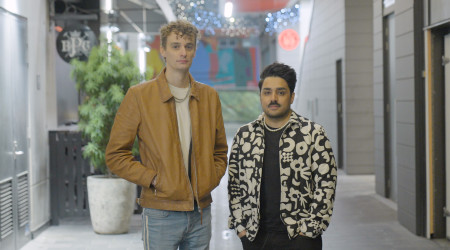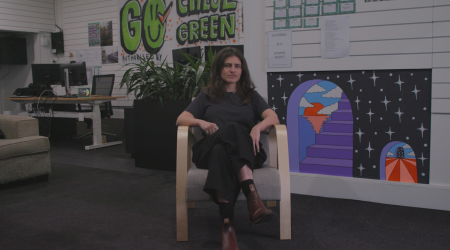In My Opinion: NZ should wipe all cannabis possession charges
By Chlöe Swarbrick and Zoe Madden-Smith
Video Producer: Zoe Madden-Smith
If you’re reading this, chances are you’ve used cannabis. Chances also are that while you’ve broken the law, doing something a majority of us have done, you don’t carry a conviction for it.
So why have more than 100,000 New Zealanders been criminally charged with something most of us have and many will continue to do? Green MP Chlöe Swarbrick writes.
The War on Drugs isn’t really about drugs. It’s a war on the poor, on Māori and on structurally marginalised people.
It’s a war waged to uphold a mythology, to service the unspoken social contract of who and what kind of people in our communities are entitled to do what they want in their private moments and those who will always be policed for existing.
No one has articulated the purpose of the War on Drugs better than John Erlichman, the policy guy (and Watergate co-conspirator) that helped create it.
In a 1994 interview, he said:
“The Nixon campaign in 1968, and the Nixon White House after that, had two enemies: the anti-war left and black people. You understand what I’m saying? We knew we couldn’t make it illegal to be either against the war or black, but by getting the public to associate the hippies with marijuana and blacks with heroin, and then criminalizing both heavily, we could disrupt those communities. We could arrest their leaders, raid their homes, break up their meetings, and vilify them night after night on the evening news. Did we know we were lying about the drugs? Of course we did.”
Fifty years later, United States President Joe Biden is admitting failure.
Not of the vilification, targeting and criminalising of marginalised communities – the War on Drugs has been a resounding success there – but on any pretence that this is keeping our communities safer.
Biden campaigned on decriminalising cannabis and on October 6, began the process by pardoning all federal offences for use and possession.
He implored State Governors to do the same and has commissioned his Department of Health and Human Services to expedite a review of the criminal classification of the drug.
Immediately, our Minister of Health, Hon. Andrew Little (who happens to be our former Minister of Justice, responsible for drafting the Cannabis Legalisation and Control Bill and stewarding its referendum process), took to Twitter claiming that the failure of 2020’s cannabis legalisation referendum meant we couldn’t hope to do anything similar in Aotearoa.
The decision on whether or not to legalise & control cannabis in New Zealand was made by referendum at the last election. The choice to decide by referendum was made in the coalition agreement between Labour & the Green Party in 2017. We have respected the referendum result.
— Andrew Little (@AndrewLittleMP) October 6, 2022
We don’t have the sort of executive powers that POTUS has. Under our system of government ministers do not interfere in judicial decision-making. Parliament passes laws which judges apply. Parliament has signalled its expectations for how Police exercise charging discretion.
— Andrew Little (@AndrewLittleMP) October 6, 2022
But New Zealanders didn’t vote on whether they wanted evidence-based, harm reduction drug law.
We didn’t vote on whether we think it’s fair that thousands of New Zealanders are still criminalised for cannabis use each year. We didn’t vote on whether the Misuse of Drugs Act needs an overhaul.
We voted on an incredibly specific 65-page draft law that proposed precisely how we could regulate legal cannabis.
When half a million more New Zealanders voted ‘no’ to selling off state assets in 2013, the National Government went ahead and did it anyway.
I’m not asking the Government to ignore the cannabis legalisation referendum like that.
Immediately after the 2020 election, we legalised drug checking services in time for the summer festival season (after a few years of some good fight and petitioning).
Drug reform wasn’t off the table then and it shouldn’t be now.
During the cannabis legalisation referendum, the ‘no’ camp was telling everyone they could that police have basically decriminalised cannabis on the front-lines.
Yet in the last ten years, more than 35,000 people have been convicted of a cannabis offence, with more than 5000 of them serving jail time.
Just last year, 2,441 people were convicted of a cannabis offence. 63% of those were low-level possession and use offences. 68% of the convicted were aged between 20-39 years old. 44% were Māori (remember, just 15% of the population is Māori).
A quarter of a million New Zealanders use cannabis for medicinal purposes and 94% of them are forced into being criminals, having to access the black market because of the highly pharmaceutical and therefore expensive legal route.
The DNA of our drug laws are not only unfair, but they’re built to self-perpetuate
The Misuse of Drugs Act contravenes the Bill of Rights Act, where if you have over a certain amount of any illegal substance, the State no longer has to prove you’re guilty, but you have to prove you’re innocent.
Substances can be classified to carry higher criminal penalties by waving through an Order in Council (usually without debate), but if you want to down-classify or declassify, you need an entire Act of Parliament (that is, at least a year’s process with a tonne of debate and scrutiny).
The Expert Advisory Committee which recommends these criminal classifications can only do so in relation to where other drugs are currently classified; they cannot recommend any other approaches to these substances which may actually, you know, reduce harm.
Because if we actually wanted to reduce harm, successive Governments have long known what to do.
In 2011, the Law Commission recommended binning the Misuse of Drugs Act for an actual health approach, instead of our criminal one.
In 2018, He Ara Oranga (the Mental Health and Addiction Inquiry) told the Government to get rid of criminal sanctions for possession of illegal drugs. In 2019, Turuki! Turuki! (the Safe and Effective Justice Review) told the Government to go further and legally regulate supply of those drugs. The Helen Clark Foundation now continues that call.
If we actually wanted to help people with drug issues, we wouldn’t be criminalising them.
Whose drug problems have ever been helped with a criminal conviction?
All of this makes me particularly angry when you realise that a majority of our Parliamentarians have also used illicit substances, “back in the mists of time”.
They now oversee drug laws that criminalise, hurt and ruin the lives of people who do exactly the same.
Criminal prohibition of cannabis hasn’t stopped people using it, but has given thousands of New Zealanders convictions and forces hundreds of thousands every year to interact with a totally unregulated black market. We continue to spend four times as much money on enforcing criminal prohibition of drugs than on health-based interventions.
Most of our politicians may prefer the fairy tale and privilege that everything is sweet as with the status quo, but their refusal to change these laws continues to hurt those with the least political power and voice.
If you want to help change that, it’s time to start using yours.
Chlöe Swarbrick is the Member of Parliament for Auckland Central, and the Green Party spokesperson for Sensible Drug Law Reform, Mental Health, Tertiary Education and other portfolios. Her advocacy for drug law reform includes campaigning for drug checking services, and health-focused evidence-based harm reduction solutions including an overhaul of the Misuse of Drugs Act 1975.
More stories:
Should NZ wipe weed possession convictions? We asked people on the street
"It's complicated."
Asking people how much their outfit costs: Christchurch edition
“Pretty much everything I am wearing is second hand.”
Stop crushing your cans, you're sending them to landfill
It's time to squash our can-crushing habit.


